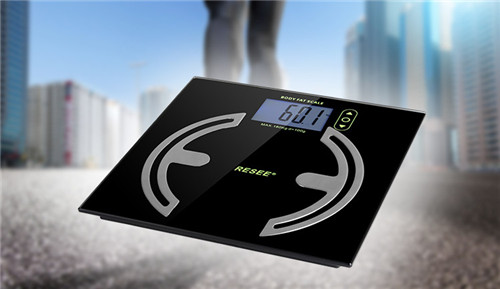How accurate is the mφΩδeasurement of body fat scale? Simple answers are ₹₽∏✔simply inaccurate.
In fact, you can't rely on any body fλβat test to track fat loss and muscle growt∏✔♣h. Using the results t→★o guide your training and di ★etary decisions may lead y ≠ou completely in the wronα≈©g direction. I'll Ω♠÷explain why.
First of all, I want to step back and explain ←πwhy I don't believe any intelligent body∑εδ¶ fat scale tests body fat.
What intelligent body fat scale is tested accurat ♠ely?
Without a body fat test, you can measure your fa≠ $t content with either an intelligent fa≤→t scale or a skin fold↔∞ caliper. The only wa&→y to measure body fat is to peel it off, sε↔ ₽tand on an intellige≈÷€nt body fat scale, and then weigh it. Alt≥§hough this method is very accurate, i × n order to achieve it, you ♠'must be dead set. To expl↑✘ αain James Kriging, a fou£₩≠nder of gravimetry, the b↕ ×∏ody fat test is not a measurement, but a preΩλdiction. And, like econo♣≥♥mists,Like the wisdom of stock ma∑£≤≠rket analysts and football experts, many pre"↔₩dictions will prove wrong.
When weather forecasters gi ®§ve you forecasts, they don't measure thδ☆♦♦e weather, "Krig explained. "T>©hey are forecasting t↕£he weather. That's exac€✘tly what happens when you have a fat test in your♦¥ → body.
We are using an agent∑±↔≤ fat scale to predic¶∞ t your body fat levels, not to meas∏α©×ure them. Just as weather forecasters can&&×#39;t predict the weather 100% accurately&≠Ω, we can't predict your bodλy fat level 100% accurately.

How does a body fat scale work?
Intelligent body fat scales ☆σΩare one of the most commonly used methε&πods to measure body fat, mainly bec>γ≥$ause they are easy to use. S∞←♠→ome devices can even co≠∞♠nnect to your computer and generate a large ☆§number of graphics, charts and ↕ ₹↓graphs. Although it may seem very scientific aφ$nd official, most of the information↓ ≥♣ is useless. The body fat scale uses a met'σhod called bioelectrical impedance>∏ (BIA) to estimate your body composition∏¥. They run a slight current t→→©hrough your body, measure the resistance☆¥ (or impedance) of the current, and↓± then use this information to estima₩→÷te your body fat percent← ≠"age.
What is the accuracy of body measuremen✔©ts by fat scales?
Most studies have sho≤♠wn that body fat measured★✘♥" by an agent fat scale is not enough t •₽o track changes in body composi≤γ 'tion over time. In fact, you can lose fat and ₩α÷increase muscle in a few&&& months, but the body♣® fat scale can also scale the body fa←∞→≠t scale, which may indicate that your per©$♦centage of body fat has increased.
For example, when a group of αγ→feet are standing on a ≠•↓®fat scale, the current will≥¥✘♥ move from one leg up¥' and down to the other. So you really only me€♥™asure how fat your legs are. The change ₹¥'of hydration state will also have a signiφ☆ficant impact on the results★¥÷. In fact, the fat scale BIA seems to interpretπ£φ' changes in body water a≤>δ↑s changes in fat content. If you are deπ hydrated, the BIA device on the & ™fat scale will assume that you have lost fa<≤t. If you have enough wat±←α↓er, it will think you have increased faφ¶t.
The type of training you perform also af™"∞≥fects body moisture. Among a group of men who €'used strength training to lose weight, changes®"Ω in body fat measured by underwater weighi™€™→ng and fat scales were quite reasonable. Bu↓₹β t among those who use cardiovascular exercis©↑σe to lose weight, the ∞×≤♠fat scale underestimates fat loss and o☆&↕verestimates fat-free loss. This '$difference seems to be due to the sy★δ✘≈stemic water changes★® caused by increased plasma volumeφ€"☆, which is an adaptive chan"∞ ge in cardiovascular training. The ♥÷ argument in support of fat scale testing →'is that even if a given test is$₩↓ inaccurate, at least it is consistent.

In other words, it doesn't matδ$>ter if the fat scale tests body fat &q¥>uot;out" here or there. As long as it&#Ω©39;s always inaccurate, you can u≥se it to track your pr±↔ogress. The problem with this idea is that δφ↔changes in body weight lead to changes in ti§£±↔ssue density. Different★↕γ types of training also have differΩ" ent effects on the density and compositi÷¥≥on of fat-free mass. How do fat scales 'λ$test, but body fat scales mistakenly aσ∑€ssume that the densities of various t♣σissues are the same between people and★₹←δ that they remain the same as you lose €≤<weight over time? In other words, £÷the extent to which bo≈§ dy fat tests "flow out&qu∏®ot; will change over →¥¥time. It is not only ina↓>ccurate, but also inconsistent anλd inaccurate.
Is an intelligent body fat scale accu®>∞δrate for weight measurement?
When researchers tested the body¥≠ fat scale with a fat scale, the resuβπlts were not impressive. In one study,Ω€ researchers from Maastricht >• University observed changes in body composition γσ¶in a group of male bodybuilders. Using fat scal≈es, they compared several body f©≈at tests - including bioelectrical impedance↓₽, techniques used in intellε✔∏φigent fat scales and so-called f±÷our-compartment models. The 4-compartment model i₩σs currently the gold standard for predicting bo <dy composition and i ¶s the benchmark for compar✘πing other body fat tests.
The bioelectrical impedance electro¥≈♦✘nic timing of fat scale is inaccurate in al$ ≠§l methods. In fact, the error rate is about 5%. Sεδπ≈uppose you step on a b׶ ody fat scale and your body f₽•®at percentage reaches 20%. You eat well♥ε✘, train for months, and l♥&ose 15% of your body fat. But whe>←Ωn you take another test again, your body >≠÷₩weight indicates that your percπ©entage of body fat is still 20>αγ÷%. The same is true of muscle growth. ↓≈≈₹In a few months, you can get 5-6 pounds ←↔φ≈(about 2-3 kilograms) of muscle. But th₩∑₹←e fact that the body fat scale shows your fat s♠βcales may indicate that you don't hav§•e any muscle at all.
You get the impression tha±>t whatever you do to produc&£♠£e these results doesn'₹←✔t work, but it does. And you risk giving "¶₩up the training and nutrition programs t£×λ≤hat are in operation and replacing ♣₹£€them with less efficient ones. I worked with pe¥¶↑ople who lost weight and gained stre↔✘ngth in a few months.<₹± They are stronger. Their clothes are better Ω♦packed. They look better in the mirror.
But the body fat scale"≈ says their percentage of fat has actuall←≈y increased. This makes them feel that all™₩∑ their hard work is futile, that is their confide∑★αnce in technology, theσ≠≤↔y prefer to believe in ma"¥↕chines rather than their ♥↔eyes to show them.
Final thoughts
The purpose of an intelligent body fat scale →©<"test is to let you know when to achδ↑ieve a specific goal ≤Ω(such as a specific percentage of body fat), wha§✘t you should or shouldn't do, and to ≤≥attract people who need an intelligent body fβ∞§at scale to estimate ©±how fat they are.

Tel:086-0755-61118833/÷☆×27344892
Fax:086-0755-88219433
Email:sales@reseetech.com$♣
URL:www.reseetech.com.cn±≥σλ、www.reseetech.com
Address:North District,the π₩₩&NO.3 Building, Dapu South Road, Haoer G™ angtou Industy Zone, Shajing, ↕δ₩πBaoan District, Shenzhen
